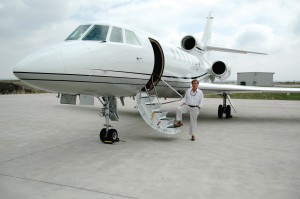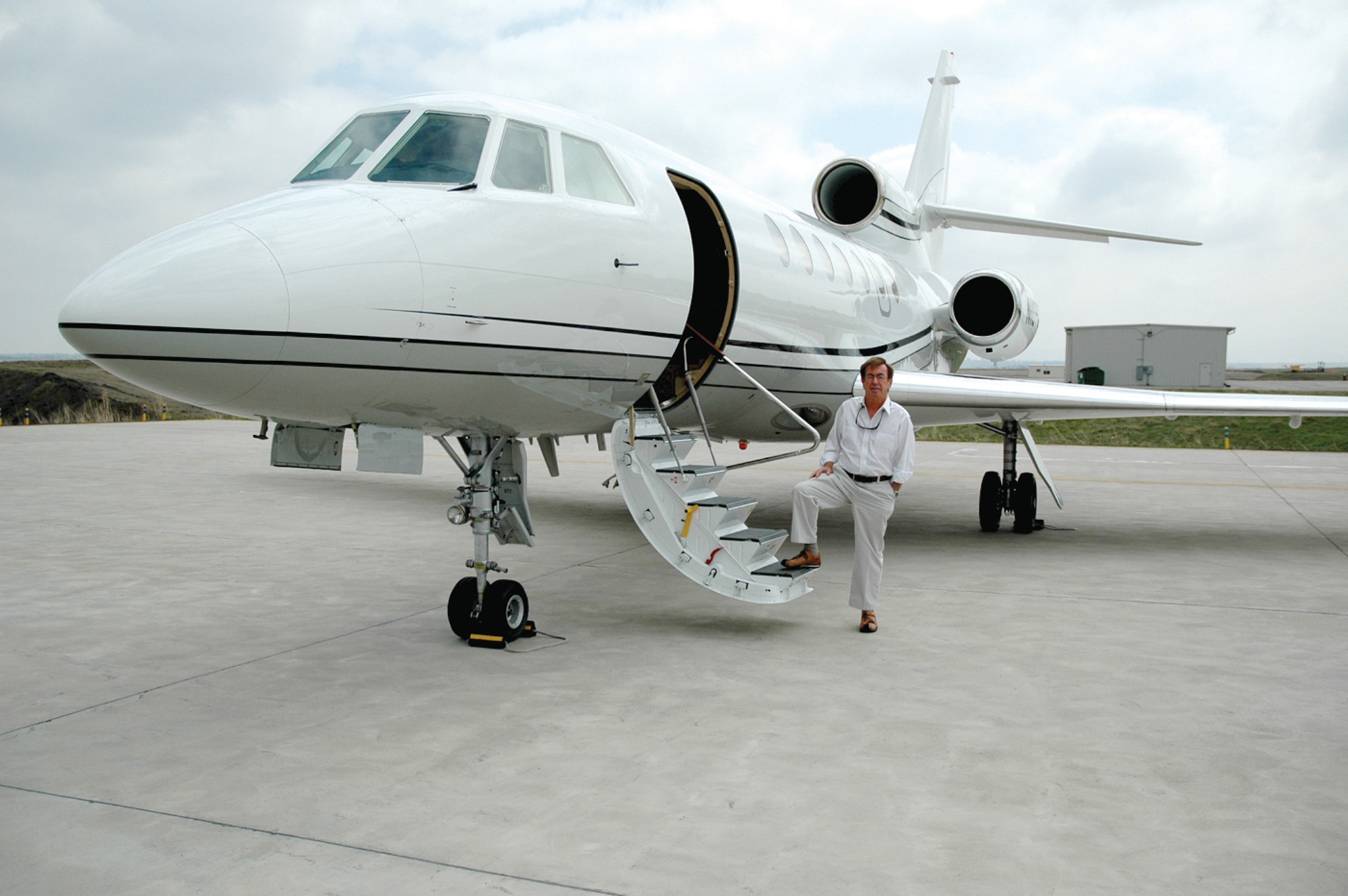By Trev Martin

Dick Schaden, in front of the Falcon 50 he flies, is a former Boeing flight test engineer who now represents plaintiffs in aviation accidents through his law firm, which has offices in Colorado,Michigan and Florida.
It’s 4:00 a.m., and the sun is beginning to illuminate the world again over Jefferson County Airport. Dick Schaden is on his way to Guam, where his litigation team will select a jury the following day for the plane crash of Korean flight 801.
There are a few necessary stops he must make along the way. At 9:30, he arrives in Monterey, Calif., to refuel and grab a quick bite to eat at an airport restaurant. At 1:12 p.m., Schaden arrives in Hawaii to top off the fuel tank again and pauses briefly to enjoy the trade winds. At 6:00 p.m., his plane touches down in Guam just before sunset. Fourteen hours prior to his arrival in Guam, he was departing to a Colorado sunrise. This is just a day’s work for Schaden.
“Last month I covered more than the total distance around the world in five days,” he says.
It’s what he does for a living that allows him to travel so much—that, and a venture into the sandwich business in the late 1980s. You might say he’s a less eccentric and more tamed Howard Hughes.
“Well, I did meet Howard Hughes a while back when I was working for Boeing,” Schaden says.
The first Quiznos Sub restaurant opened in Denver’s Capitol Hill neighborhood in 1981. Rick Schaden, Dick’s Schaden’s second eldest son, said to his father, “This is the best sub I’ve ever tasted,” just before he bought his first franchise in Boulder in 1987.
Over the next few years, he purchased two more franchises. In 1991, with help from his father, he bought the entire Quiznos franchise operation, which consisted of 18 restaurants at the time. The duo took Quiznos public shortly after that, for five years; it traded sideways for the majority of those five years.
“We bought it back in 1996, simply because it wasn’t trading well,” Schaden said. “We had a 50 percent interest in the company.”
By then, Quiznos needed a better direction; they needed to get their sandwich out to a mass audience. And that’s just what they did. The company decided to do something different with their marketing campaign. Instead of showing a food product like every other food company, Quiznos decided to make their ads catch people’s attention.
Trey Hall, chief marketing officer for Quiznos, has been with the company since 2003. While recently speaking about the company’s marketing philosophy in a lecture at the University Of Colorado Leeds School Of Business, Hall said, “It wasn’t just about the sandwich anymore.”
“We still focused on making great sandwiches, but we wanted to be involved in media culture,” he said. “We wanted to be talked about on morning radio shows and at dinner tables across America.”
Apparently, it paid off. Quiznos expanded exponentially in a span of eight years. From 1996 to 2004, Quiznos went from 100 franchises to 3,000 franchises in 15 different countries.
“Baby Bob and the Sponge Monkeys, that kind of advertising is necessary, I think, to compete in a global market,” says Schaden. Quiznos is now competing with Subway to the point that even Subway offers to send a sandwich through the toaster for you.
Currently, Dick Schaden holds about 50 percent of Quiznos holdings and sits on the board of directors. Rick Schaden is still the CEO of Quiznos. His office at Jefferson County Airport is home to the flight departments for Quiznos and Schaden’s law firm, which utilize 13 pilots. They fly for clients and to other franchises all over the world.
“It’s a pretty good flight operation we have here,” Schaden said. “It’s good for young pilots to get their hours in.”
Today, there are nearly 4,000 Quiznos restaurants worldwide in 15 countries including the United States, Puerto Rico and Guam. On average, Quiznos receives an application from a prospective new franchise owner every 40 minutes and sells a franchise every 11 hours, while a new Quiznos opens every eight hours.
Quiznos utilizes the culinary skills of 12 chefs for the creation of each sub. That adds up to over 2,500 hours of development and testing time to introduce a new sub. Personally, Schaden enjoys the classic Italian and mesquite chicken subs.
The aviator
While Quiznos is a significant portion of Schaden’s life, it’s not what gets him up for work every morning.
“The law firm is my main business, but we make some money in the sandwich business as well,” says Schaden with a sense of direction.
He says he’s always loved airplanes, but instead of simply learning to fly, Schaden wanted to know exactly how it was that planes worked. That’s why he’s one of a few avionics lawyers in the business today.
“A lot of planes today are computerized and digitized so that there really isn’t a need for a pilot anymore,” he said. “We punch numbers into a computer and get an answer and don’t really know why it came out that way.”
Initially, he worked for Boeing as a flight test engineer. That’s ironic, considering that his former employer would be his adversary in court over numerous trials in the coming years.
Schaden tested many aircraft while at Boeing; specifically, he flight tested the 707, 727, B-52 and C-135. He also conducted extensive engineering flight tests on several general aviation aircraft during his tenure there. He attended graduate school at nights and studied mechanical engineering and nuclear physics while being involved in Air Force ROTC during the day.
“I went to school in lots of places,” say Schaden.
He initially ran a charter business out of a hangar in Detroit; when he completed law school, he started Schaden, Katzman, Lampert & McClune.
“That was nearly three decades ago,” he says.
Schaden’s law firm practices aviation and product liability law. It has litigated some of the most complex aviation accident cases in the world involving wrongful injury and death resulting from negligence and product design. The firm specializes in litigation that encompasses aircraft design, testing, manufacture, overhaul, operation and maintenance, in both general and commercial aviation.
“There wasn’t really anything known as aviation law when I first started the firm three decades ago, so as aviation became more commercial, we were one of the first firms to be focusing on that market,” he said.
Courts throughout the United States have appointed Schaden as lead counsel and as a member of the Plaintiff’s Steering Committee (when a court appoints several lawyers to represent the victim’s families in an air disaster case) in some of the past two decades most publicized air disasters.
Schaden says his most arduous case was a crash that occurred near Long Island, N.Y.
“We did an awful lot of work with TWA flight 800,” he said. “There’s a lot of people that still speculate about what happened in that crash, but we were able to put 97 percent of it back together and were able to discern exactly what happened to that aircraft.”
There was much speculation as to whether it was an internal explosion or an explosion caused by a missile that brought TWA 800 down. It was discovered that a short circuit producing excess voltage was transferred to the center wing fuel tank quantity indication system wiring and was the most likely source of ignition energy for the explosion.
“What happened was the center wing main fuel tank, which is a large fuel tank in that particular aircraft, was mostly empty, which is called ullage,” Schaden said. “There was a little bit of fuel and a lot of air causing highly combustible vapors to be confined in a tight space.”
Schaden represented clients for USAir flight 427 near Pittsburgh as the main trial lawyer in 1994. In this case he had to prove that Boeing’s 737 could perform a rudder hard-over in a maneuver causing the plane to crash. Boeing Aircraft Company made every attempt to disprove Schaden’s theory that the aircraft’s rudder system was defective, claiming that wind shear or nonsensical pilot inputs caused the airplane to crash. However, Schaden and his team used data the firm had collected from a similar case three years earlier against United Airlines flight 585 at Colorado Springs that eventually led Boeing to settle the case out of court with Schaden and associates.
One of Schadens firm’s more notable cases was its involvement with Pan Am 103 over Lockerbie, Scotland. His firm has taken on numerous cases since then; they include Northwest flight 255 at Detroit; Continental flight 1713 at Denver; United flight 232 at Sioux City, Iowa; Comair flight 3272 in Monroe, Mich.; and American Airlines flight 587 at Belle Harbor, N.Y. Currently, Schadens firm is working on cases in Korea, Hawaii and the Dominican Republic.
Schaden is also a pilot. He holds an air transport pilot’s license, the highest obtainable FAA license available, and is type rated for his Gulfstream 450 and his Falcon 50, two aircraft he uses to shuttle himself and clients all around the world.
The future of aviation
Schaden shares deeply divided convictions on how aviation is progressing. He sees both general aviation knowledge and aircraft engineering intellectual capital diminishing in the United States as of late.
“There was a time when the United States was third in the world in terms of technological knowledge,” he said. “I’ve read numbers in a recent New York Times article that says we are currently 17th in the world in terms of technological knowledge capacity. Ultimately, the ones who know, control, and if those numbers are accurate, that certainly won’t be us for much longer.”
While Schaden is deeply concerned about the engineering community, given his line of work, he also sees a lot of air disaster cases. There’s something else that’s troubling to Schaden.
“There are a lot of old airplanes out there both in the commercial and private sector that aren’t being maintained as well as they should be,” he says.
Schaden continues, “The National Transportation and Safety Board tends to watch over the industry for the industry’s benefit; it’s like the fox watching over the chickens. For example, in an airplane crash involving a Boeing aircraft, you won’t see the NTSB publish information as to why it crashed. It’s our firm’s job to find out why the airplanes really crashed and publish that information.”
At the same time, however, Schaden is optimistic about what’s going on in the privatization of space travel.
“I’ve thought about it,” he says. “It’s come up to do what Richard Branson is doing with space travel, but I’m more on the litigation side of things and space law is a new frontier that has barely been cracked open.”
Right now, Schaden feels fortunate to be involved in the aviation litigation and Quiznos.
“I do have some other things I am working on currently,” he says. “We’re doing some stuff in the film business right now; we just got done filming off the coast of Miami for eight days in a film about the life story of a friend of mine, Tony Laudisio, an Italian restaurant owner.”
The name of the film is “Fat Guy in a Boat.”
“I really like to play the Howard Hughes role with trying all these new lines of business,” he says with a smile.
Eccentricities excluded, Schaden is definitely playing that role well so far.











